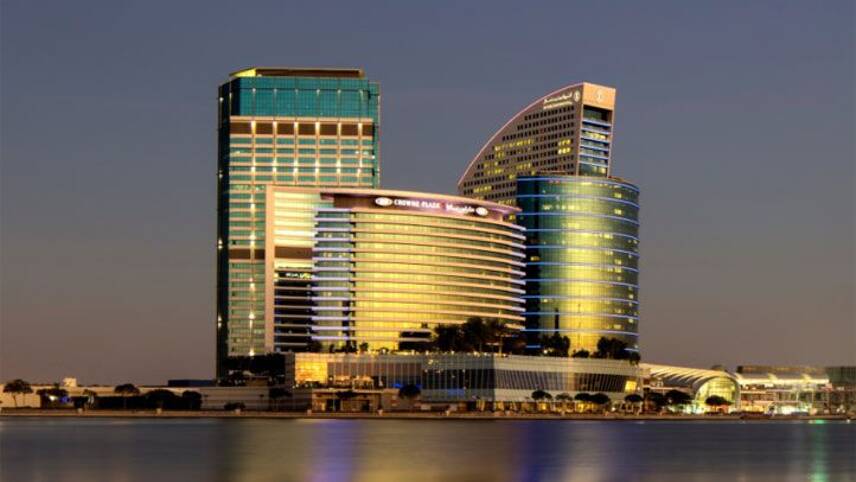Register for free and continue reading
Join our growing army of changemakers and get unlimited access to our premium content

Pictured: One of IHG's Crown Plaza hotels in Dubai
The business, which owns brands including Holiday Inn and Crowne Plaza, has made the new environmental commitments as part of a sweeping new responsible business action plan designed to help the business deliver a sustainable recovery post-pandemic.
Called ‘Journey to Tomorrow’, the plan details new ambitions across five key topics: water, waste, carbon and energy, communities and “our people”. The latter covers staff, owners and suppliers.
On carbon and energy, IHG has committed to implementing verified science-based targets for reducing emissions. It has submitted targets 2030 targets, including a 15% reduction in absolute operational emissions and a 46% reduction in emissions intensity in franchises, to the Science-Based Targets Initiative (SBTi). To meet these targets, IHG has outlined plans to ensure that all new buildings are either zero-carbon or extremely low-carbon in operation. It will also scale up its procurement and generation of renewable energy.
The ‘waste’ pillar of the new plan is headlined by a commitment to eliminate all hard-to-recycle single-use items of all materials from guest-facing operations. IHG has already phased out plastic straws and miniature bathroom toiletries housed in plastic. The pillar also details plans to implement a new food waste reduction plan across IHG’s global estate of 6,000+ hotels and resorts.
On water, IHG will develop a context-based water strategy that prioritises hotels in areas of highest water risk. The strategy will help hotels to reduce their own water consumption; to collaborate with other water basin users on efficiency, conservation and restoration; and to bring water, sanitation and hygiene (WASH) infrastructure, education and services to local communities. The UN estimates that some 4.2 billion people worldwide lack access to either safely managed water or sanitation, or both.
Social sustainability
IHG’s updated approach to social sustainability covers both the people within its operations, franchises and supply chains – and the communities in which it is present.
On the former, IHG’s vision is to “champion a diverse culture where everyone can thrive”. The business has committed to achieving gender balance within leadership roles and doubling the representation of under-represented groups, including ethnic minorities and people with disabilities, within leadership teams.
It will also develop new strategies covering mental health, physical wellbeing, inclusion and human rights. On the latter, risks are present in franchise models and in outsourcing services. There is also the risk of hotels being used for trafficking or sexual exploitation.
The “communities” pillar is headlined by a commitment to improving the lives of 30 million people by 2030. IHG’s new commitments on WASH will contribute to the delivery of this aim. The business will also develop new collaborations to tackle food poverty and broaden training and innovation initiatives.
IHG’s chief executive Keith Barr published an open letter to mark the launch of the new plans, in which he said he wants the business to “do what’s right, not just what’s needed” for financial success.
The letter states: “We want every IHG stakeholder to see that we’re on a journey to be successful in every sense of the word, and we are determined to contribute towards positive social and economic change, to stand up for key issues such as diversity, equity and inclusion and human rights, and to make more responsible environmental choices. I believe that how we grow as a company and work to be a greater force for good are inextricably linked.”
Hospitality sector trends
Hospitality, leisure and tourism have undeniably been some of the hardest-hit sectors amid the Covid-19 pandemic. PwC is forecasting that it could take four years for hotels in geographies including the UK to financially recover.
Some firms are looking to improve sustainability measures as a way to attract guests, retain staff, reduce costs and build resilience against future crises. Several big names have unveiled new green recovery plans. Whitbread, for example, recently committed to installing electric vehicle (EV) chargers at 300+ Premier Inn hotels after outlining new climate targets. Elsewhere, Iberostar has committed to becoming a carbon-neutral business by 2030. It is planning to accelerate energy efficiency and low-carbon energy initiatives while scaling up nature conservation and restoration schemes.
However, commitments like this appear to be the exception rather than the norm at present. Of the sustainability and energy professionals in this sector that answered edie’s Green Recovery Survey questions, two-thirds said they had to delay or cancel sustainability-related announcements as a result of Covid-19. Moreover, more than half (52%) of hospitality and leisure respondents had placed sustainability or energy staff onto the Government’s furlough scheme, while 29% had to make staff in those functions redundant.
Sarah George


Please login or Register to leave a comment.